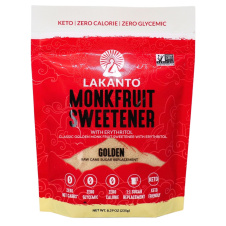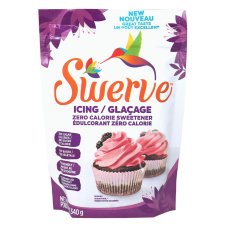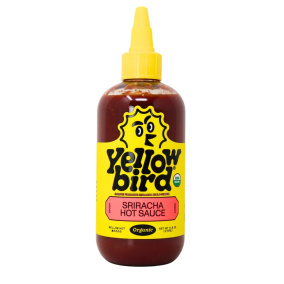
Sugar Substitutes: Choosing The Best Sugar Alternative For You
Life sure is sweet! But it can be a whole 'lot sweeter when you can enjoy your favourite treats, guilt-free! Here's everything you need to know about the most popular sugar alternatives, so you can keep sweetness without any of the sugar!
If you have a sweet tooth, it can be hard to go without your daily dose of sugar. But eating too much added sugar can take a toll on your health. Excessive sugar consumption has been linked to cardiovascular disease, diabetes, and obesity. With many hidden culprits of added sugar, like energy drinks, bread, cereals, and even dairy products, many of us are consuming too much sugar without even knowing it!
Reducing your added sugar intake doesn’t mean that you need to give up sweets entirely! There are some healthy alternatives out there that can help you curb your cravings, while still satisfying your sweet tooth. Many sugar substitutes are low in calories and have little effect on your blood sugar levels! Perfect for diabetics, those following a keto diet, or anyone watching their intake! By swapping out your regular sugar for one of these alternatives can have a great impact on your overall health. A small change with a big impact! But how do you choose which ones are best?
Before choosing a natural sweetener, ask yourself:
- Do you just need it to sweeten your morning coffee or tea, or do you plan to bake with it?
- Are you diabetic or concerned about side effects?
- Do I like the taste?
There are many different types of sugar substitutes available that can suit all sorts of different lifestyles. We’re going to focus on the two most popular types of sugar substitutes–sugar alcohols and novel sweeteners.
Sugar Alcohols
Sugar alcohols, or polyols, are carbohydrates. They're hybrids of sugar molecules and alcohol molecules—but don't worry, they're not as scary as they sound! Sugar alcohols are about 25–100% as sweet as sugar, depending on the type, and are considered low-calorie sweeteners since they’re lower in calories and don’t have the same negative effects as regular sugar, such as promoting tooth decay and significantly raising blood sugar levels.
The most widely used types of sugar alcohols used in the food industry are xylitol and erythritol because their flavour most closely resembles that of regular sugar. Your body can’t fully break down sugar alcohols, which means that they cause a much less significant rise in your blood sugar levels than sugar does. Since they aren't fully digestible, keto dieters often subtract the sugar alcohols and fibre from the total number of carbs in a food item.
Erythritol
Erythritol is approximately 60-80% as sweet as table sugar and contains just 5% of the calories that regular table sugar does at approximately 0.2 calories per gram. It’s found naturally in some fruits and fermented foods, such as wine and beer.
When you eat foods containing erythritol, your body doesn’t have the enzymes required to digest it properly. Instead, it moves through your system mostly unchanged and has no effect on blood sugar or insulin levels—making it a great alternative to regular sugar for people with diabetes or who are concerned about cardiovascular issues and heart disease risk factors.
Erythritol has a clean taste with no aftertaste—it’s a favourite for many people!
Xylitol
Xylitol is a common ingredient in many products, from sugar-free chewing gum and even dental hygiene products! This is due to the fact that xylitol is non-fermentable, which means that the bacteria in the mouth cannot convert it into the harmful acid that causes tooth decay. When you chew gum with xylitol or use it as a sweetener, the harmful bacteria in your mouth starve to death. So xylitol actually reduces tooth decay and plaque formation, and can prevent cavities!
Xylitol is just as sweet as sugar, and has a low glycemic index (GI) of about 7. This means that consuming it does not cause spikes in blood glucose or insulin levels in the body. For this reason, xylitol is a good sugar substitute for people with diabetes. Xylitol is generally safe, but like other sugar alcohols, it can cause digestive issues such as bloating and diarrhea in some people
Erythritol V.S. Xylitol
If you’re looking for a healthier alternative to sugar, both erythritol and xylitol could be worth considering. However, when it comes down to choosing between these two sweeteners, there are some differences in their overall health benefits and uses that may help you decide which one is best for your needs:
- Erythritol has a lower GI than Xylitol
- Xylitol is just as sweet as sugar, while Erythritol is a bit less sweet
- Erythritol is slightly lower in calories than Xylitol
Novel Sweetener
Novel sweeteners are a new class of natural sweeteners that have grown in popularity over the last decade. Novel sweeteners are hard to fit into a particular category because of what they're made from and how they're made. Generally, these sweeteners are derived from natural sources that are highly refined and are usually combinations of various types of sweeteners. Most novel sweeteners contain no calories or carbohydrates so they don’t lead to weight gain or blood sugar spikes. And each provides unique health benefits that other sugar alternatives cannot. Two novel sweeteners are currently “generally recognized as safe” by the FDA: stevia and monk fruit extract.
Monk Fruit
Monk fruit is a natural sweetener made from a tropical plant native to Southeast Asia. It contains a unique magical ingredient called mogrosides! Studies have shown that mogrosides have antioxidant and anti-inflammatory properties, and during processing, it’s separated from the fresh-pressed fruit juice. This extract ranges between 150-200 times sweeter than sugar–that’s intense! Because of this, many products mix monk fruit sweeteners with other sweeteners like erythritol, to reduce the intensity of the sweetness.
Monk fruit extract contains zero calories, zero carbohydrates, zero sodium, and zero fat. The slight drawback of monk fruit is its taste—some people report a fruity aftertaste when using it! If you're looking for something more neutral-tasting than the other options on this list, however, monk fruit might be just the thing for you!
Stevia
Stevia is an herb native to South America that has been used for centuries in South America and Asia as a sweetener. Stevia can only be used and sold as high-quality extracts of the plant's sweet active ingredients, the most popular of which is Rebaudioside A (Reb-A). Reb-A is about 200 times sweeter than table sugar with zero calories, zero carbs, zero fat, and has virtually no effect on blood sugar levels. Reb-A sweeteners are also available in liquid, powder, and granulated forms.
Sweeteners made with Reb-A are considered “novel sweeteners” because they’re blended with different sweeteners, such as erythritol (sugar alcohol) or dextrose (glucose). Although stevia is considered safe for people with diabetes, brands that blend it with dextrose should be treated with caution.
Monk Fruit V.S. Stevia
If you're looking for a sweetener that won't impact your blood sugar levels and is a better choice than regular sugar, then monk fruit and stevia are both great choices!
Both contain zero calories, zero carbs, and zero sugar. They're both safe to consume by children and women who are pregnant or nursing. They each contribute no carbohydrates to a keto diet, and they both have glycemic indexes of zero—meaning neither will raise blood sugar levels for diabetics.
With stevia, some people do experience bloating and nausea after consuming the sweetener regularly. By contrast, monk fruit sweeteners do not cause the same types of stomach distress. The main difference between these two types of sweeteners comes down to taste—stevia tends to have a slightly bitter aftertaste while monk fruit may have less flavour—but for most people, it's worth trying them both out and seeing which one you prefer!
Final Thoughts
Sugar substitutes are a great way to cut down on the amount of sugar in our diets. Whether you want something to sweeten your morning coffee or just dip a few berries into, there's sure to be a substitute out there for you. Be sure to research the health implications of each option before making any drastic changes in your diet, but know that all options will likely have some benefits over regular sugar consumption!





